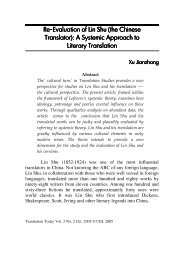Drama Translation: Principles and Strategies Drama Translation ...
Drama Translation: Principles and Strategies Drama Translation ...
Drama Translation: Principles and Strategies Drama Translation ...
You also want an ePaper? Increase the reach of your titles
YUMPU automatically turns print PDFs into web optimized ePapers that Google loves.
56 <strong>Drama</strong> <strong>Translation</strong>: <strong>Principles</strong> <strong>and</strong> <strong>Strategies</strong>translate it aloud <strong>and</strong> to listen carefully to—even tosavour— the various versions into which everyconceivable line can be translated in English. Havingdone that, he should read his translation aloud to someonetotally unacquainted with the play, preferably an actor.[…] What the dramatic translator must watch out forparticularly is an excess of sibilants in a sentence, orawkward consonantal clusters that may make a line hardto pronounce rapidly <strong>and</strong> thus may cause difficulties insound projection […] the language must fall easily <strong>and</strong>familiarly on the ears of the audience.” [Emphasis initalics is mine.]Another representative scholar of the eighties, who hasclearly enunciated principles to be followed by the drama translator,is Zuber-Skerritt (1988:485-486). He too asserts that:“A play written for a performance must be actable <strong>and</strong>speakable. Therefore, non-verbal <strong>and</strong> cultural aspects <strong>and</strong>staging problems have to be taken into consideration. […]Entfremdung is dealienation of the foreign language bytranslating it into a language which the author would haveused if he/she had lived in the time <strong>and</strong> place of the targetlanguage. There is no doubt that the latter is preferable, ifnot m<strong>and</strong>atory, in drama translation for the audience mustbe familiar with the language in order to underst<strong>and</strong> itsmeaning immediately.”[Emphasis in italics is mine]From the above review it can be said that on the face of itthese principles seem feasible to be followed. However, one maywonder to what extent some of them can be successfully applied inpractice by the drama translator, particularly in the case ofWallwarth’s principle which states that “it is absolutely imperativewhen translating a play to translate it aloud <strong>and</strong> to listen carefully to- even to savour -- the various versions into which virtually everyconceivable line can be translated”. Furthermore, the principle thatthe drama translator must watch out particularly for “an excess of
















